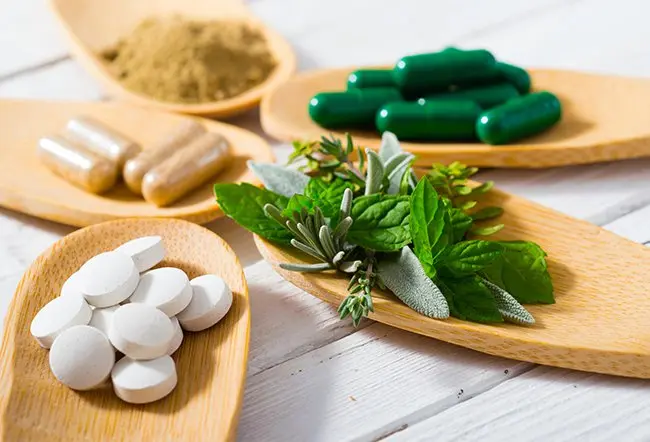12 Herbs with Drug Interactions

Almost one-quarter of adults in the U.S. report taking a prescription medication along with a dietary supplement, which may include herbs. However, many herbal supplements can cause drug interactions.
It is important to talk to your doctor before taking any herbal supplement in case there may be herb-drug interactions.
Some herbs that can interfere with medications include:
- Black cohosh
- Black cohosh may reduce the effectiveness of drugs such as amiodarone (Pacerone, Nexterone), fexofenadine (Allegra), glyburide (Glynase), and many statin medications
- Curcumin (Curcuma longa)
- Curcumin been shown to increase sulfasalazine (Azulfidine) levels
- It could decrease levels of many antidepressant and antipsychotic medications
- Echinacea
- Echinacea may have effects on CYP1A2 and CYP3A4 enzymes, potentially with even short-term use, including antipsychotic and antidepressant medications
- Garlic (Allium sativum) extract
- Garlic extract decreases concentrations of drugs transported by P-gp such as colchicine (Mitigare, Colcrys), digoxin (Digox, Lanoxin Pediatric, Lanoxin), doxorubicin (Adriamycin), quinidine, rosuvastatin (Crestor), tacrolimus (Prograf), and verapamil
- Can thin the blood in a manner similar to aspirin, which may be a problem during or after surgery
- Ginkgo (Ginkgo biloba)
- Ginseng (American) (Panax quinquefolius)
- Different from Asian ginseng (Panax ginseng)
- American ginseng may lower INR in patients taking warfarin
- Ginseng (Asian)
- Different from American ginseng (Panax quinquefolius)
- Asian ginseng refers to Chinese, Japanese, and Korean ginseng
- Could decrease the effectiveness of many drugs, including calcium channel blockers, many chemotherapy drugs and HIV agents, certain antihypertensive and statin medications, and some antidepressants
- Patients having difficulty maintaining adequate anticoagulation with warfarin may be advised to avoid Asian ginseng products
- Goldenseal (Hydrastis canadensis)
- Goldenseal inhibits two major metabolic enzymes, CYP2D6 and CYP3A4, which are responsible for metabolism of more than one-half of currently used drugs
- The use of goldenseal is not recommended in combination with most other medications
- Green tea (Camellia sinensis) extract
- Green tea extract has been shown to increase simvastatin (Zocor) concentrations
- May inhibit the drug transporters OATP1A1 and OATP1A2, which are involved in the transport of many medications, including statins, fluoroquinolones, some beta blockers, imatinib (Gleevec), and antiretrovirals
- Concentrated green tea supplements can interact with pseudoephedrine (Sudafed)
- Kava kava
- Kava kava may inhibit CYP2E1, which is involved in the metabolism of several anesthetic agents and acetaminophen (Tylenol)
- It may inhibit CYP2C9 and CYP2C19, which are involved in the metabolism of many nonsteroidal anti-inflammatory drugs (NSAIDs) which may include ibuprofen (Advil, Morin) and naproxen (Aleve), angiotensin receptor blockers (ARBs), glipizide (Glucotrol), glyburide (Glynase), rosiglitazone (Avandia), valproic acid (Depakene), warfarin (Jantoven, Coumadin), proton pump inhibitors (PPIs), phenytoin (Dilantin), and clopidogrel (Plavix)
- Patients taking kava may be advised to stop at least five days before surgery with general anesthesia
- Patients taking medications metabolized by CYP2C9 or CYP2C19 should be closely monitored for adverse effects and laboratory abnormalities or may be advised not to use kava-containing supplements.
- There is an increased risk of drowsiness and motor reflex depression when kava kava is combined with central nervous system depressants, such as benzodiazepines or alcohol
- Milk thistle
- St. John's wort (Hypericum perforatum)
- St. John's wort interacts with many medications and should not be used with over-the-counter (OTC) and prescription medications
- Is a potent inducer of CYP3A4 and P-gp
- Studies have shown reductions in cyclosporine (Sandimmune), tacrolimus (Protopic, Envarsus XR, Astagraf XL), warfarin (Jantoven, Coumadin), protease inhibitors, irinotecan (Camptosar), theophylline (Theo-24, Elixophylline, Theochron), digoxin (Digox, Lanoxin Pediatric, Lanoxin), venlafaxine (Effexor XR), and oral contraceptives
Health Solutions From Our Sponsors
From 
Drugs and Treatment Resources
Featured Centers
Health Solutions From Our Sponsors
Reviewed on 1/12/2023
References
Image source: iStock Images
https://www.nccih.nih.gov/health/tips/tips-how-herbs-can-interact-with-medicines
https://www.aafp.org/pubs/afp/issues/2017/0715/p101.html
https://www.nccih.nih.gov/health/tips/tips-how-herbs-can-interact-with-medicines
https://www.aafp.org/pubs/afp/issues/2017/0715/p101.html
